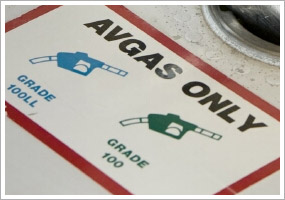| The following stories from the October 10, 2008, edition of AOPA ePilot were provided to AOPA members who expressed an interest in the particular subject areas. Any AOPA member can receive information tailored to their areas of interest by updating their preferences online. TRAINING TIPsMisfueling Many safeguards prevent this from happening, such as the training of line crews, the color-coding of fuel—even the design of refueling equipment that builds incompatibility into attempts to fuel an avgas-powered aircraft with jet fuel. And let's not omit pilot watchfulness from any list of preventive measures. Did the proper fuel truck pull up in front of your trainer after you called for a top-off? Still, misfueling incidents happen, often with severe consequences. Indeed, that last line of defense—pilot supervision—doesn't always get the respect it deserves. "Why do misfueling incidents happen? There are many reasons, but a contributing factor in most incidents is a lack of pilot oversight," notes the AOPA Air Safety Foundation's Misfueling Safety Brief . Note this surprising statistic: Although pilots are likely to oversee oil changes and getting air added to an aircraft's tire, only 39 percent attend the refueling of their aircraft, according to a survey. See the Safety Brief's fueling checklist for things you can do during the ordering, fueling, payment, and preflight inspection processes to detect fueling mistakes. Doing so may also stiffen your resolve to be thorough at times when there's temptation to shortcut checklist items. Learn more in the February 2006 AOPA Flight Training feature " Unlucky 13." Conditions of low light during preflights are another reason for caution. Robert N. Rossier had advice about that in his AOPA Flight Training article Fuel Check : "When you check a fuel sample at night, hold the sample against a white backdrop, such as the fuselage, and shine a light on it from the side. The white backdrop makes it easier to detect the color of the fuel, and a light shining from the side illuminates debris and contaminants more readily. Check out his other suggestions for ascertaining what type of fuel your tanks contain. Misfueling is an avoidable problem. Pilot alertness is the best form of prevention TRAINING PRODUCTSBlockalls view-limiting gear for instrument trainingLooking for a new view-limiting device for instrument training? Blockalls are essentially a pair of safety glasses with a colored coating over most of the viewable area. Eight different colors are available, including green, red, black, and pink. The device features soft rubber nose pads and a stem with a soft, flexible rubber end to make them easy to put on and take off. Each pair comes with a plastic case to protect them inside a flight bag. The price is $23.95. Order online or call 239/222-3588. Note: Products listed have not been evaluated by ePilot editors unless otherwise noted. AOPA assumes no responsibility for products or services listed or for claims or actions by manufacturers or vendors. FINAL EXAMQuestion:I just received my private pilot certificate, and my parents want to celebrate by paying for a rental aircraft and having me fly all of us on a short trip. They want to pay for the entire flight. Is this allowed as a private pilot? Answer:While it is perfectly legal for you, as a private pilot, to share the expenses of your flight with your passengers, you do have to pay a pro rata (proportionately equal) share of those expenses, according to FAR 61.113(c). Tell them that although you appreciate the offer, you'll have to pay no less than your share of fuel, oil, airport expenditures, and rental fees. And by the way, congratulations, and enjoy your flight! For additional information, review this Pilot Counsel article on sharing expenses.
Got a question for our technical services staff? E-mail to [email protected] or call the Pilot Information Center, 800/872-2672. Don't forget the online archive of "Final Exam" questions and answers, searchable by keyword or topic. |
 The
The 

